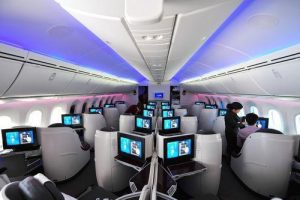
SES S.A., the Luxembourg-based commercial satellite communications provider, and Global Eagle Entertainment (GEE), announced on 19 April 2016 further agreements to provide Ku-band capacity to provide enhanced in-flight Internet connectivity for airline passengers in the Middle East and other parts of the world.
Los Angeles, California-based GEE is a worldwide provider of aircraft connectivity systems, operations solutions, and media content to the travel industry, and is working with SES to enhance its range of in-flight connectivity services by utilizing secure multiple transponders of wide beam Ku-band coverage aboard SES’s NSS-12 and AMC-1 satellites to meet the fast-growing passenger and airline demand for more connectivity across the Middle East as well as India, Central Asia, and North America.
With this latest agreement GEE is now tapping 12 SES satellites to put together a complementary mix of Ku-band wide beam and upcoming Ku-band high throughput satellite (HTS) spot beam coverage to meet various levels of inflight connectivity demand along travel routes around the globe.
“SES has built a robust and scalable global infrastructure to meet the growing demand for inflight entertainment and connectivity,” said Elias Zaccack, Senior Vice President, Commercial, Americas, and head of Global Mobility solutions at SES. “SES is committed to delivering a great mobile experience to airline passengers, and these latest capacity agreements with GEE will bring a new level of inflight connectivity to both expanding and emerging markets.”
SES, with a fleet of over 50 satellites in geostationary orbit, is one of the world’s leading satellite communications providers for Internet and content providers, broadcasters, corporate and government organizations, and fixed and mobile network operators.
Speaking on behalf of GEE about the agreement, CEO Dave Davis said, “GEE is in the midst of a strategic expansion of our global inflight connectivity network to meet the growing and evolving demands of airlines and their passengers for a new wave of high-speed Wi-Fi-based services.”
Davis went on to say that, “Together with SES, GEE continues to proactively add significant levels of bandwidth over established inflight connectivity markets, as well as developing regions such as Asia and the Middle East where passenger demand is accelerating the deployment of connected aircraft over new routes.”
Among GEE’s clients in the Middle East are Abu Dhabi-based Etihad Airways and Oman Air.
 SpaceWatch.Global An independent perspective on space
SpaceWatch.Global An independent perspective on space

